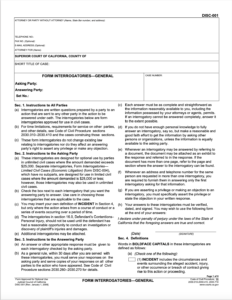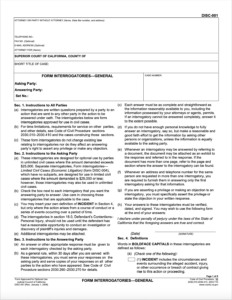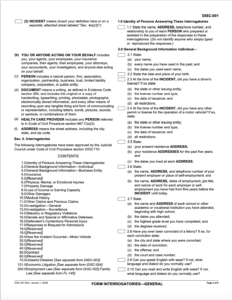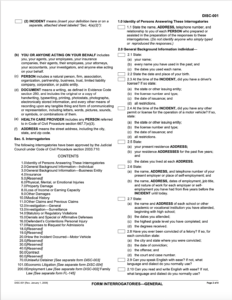For those entering their first California court case, they may feel anxious and nervous about the litigation process ahead. Writing and receiving interrogatories can be challenging if you do not understand what they are and how they bolster your legal presentation. Even if you have a complete knowledge of what occurred in your administration or estate planning case, it does not automatically speak the language of the judge and jury.
A necessary stage before the courtroom, we educate our clients on probate interrogatories from our professional experience dealing with them. These can apply to special interrogatories in areas such as trustee removal or be used in general cases. For most people, we find it especially helpful when they can view some sample probate interrogatories so they can understand what lies ahead and be at ease.
What are Interrogatories?
Interrogatories are a set of questions presented on a formal document regarding the case at hand. However, they are not allowed to force legal conclusions but rather ask specific questions about what occurred, giving the judge the ultimate decision.
These occur in the discovery stage of your lawsuit (before the case hearing) and require deposition, which means you will be sworn in by a California court reporter before you answer. You and your lawyer will create interrogatories for the plaintiff while they will send you a document as well.
The Four Components
Each interrogatory document differs due to the kind of case involved such as will contests and the particular lawyers that write them. Among them all, there are underlying similarities that can be found. The four key components to any probate interrogatories in legal cases are the Plaintiff/Defendant Information, Instructions, Definitions, and Interrogatory Questions.
Plaintiff/Defendant Information
General information about the plaintiff and defendant are recorded at the beginning of the interrogatory formal document. In the case of this example of an interrogatory, two opposing parties are going to court regarding a car accident, so the names and addresses of both drivers would be included.
Although it is obvious to a judge which court the lawsuit will be heard in, the location is important to higher courts and other legal professionals that may later take part. The specific case number and other lawsuit details are kept for easy reference when presenting it to the California judge.
Instructions
State and federal laws in relation to interrogatories are outlined in the instructions so the receiving party is clear on how they should respond. Again, they are reminded to answer every question in its entirety and do so under oath by a court reporter to ensure honesty.
The Instructions call for the identity and location of persons involved and the identity of expected witnesses. However, whenever a question crosses the boundaries in demanding a legal conclusion or has nothing to do with their case, a defendant or plaintiff can reject the question altogether.
Definitions
Some sample probate interrogatories such as this one lays out key definitions beforehand that will be included in the Interrogatory Questions section ahead. Opposing lawyers want to guarantee a mutual understanding for ambiguous terms that can become muddled in the litigation process.
For example, “the incident” or “the accident” refers only to the incident or accident on the date that is challenged in the courtroom. A plaintiff could see these terms throughout the interrogatories and answer them about different car accidents rather than the one proposed by the defendant.
Interrogatory Questions
The three previous key components to any interrogatory formal document lead to the climax of Interrogatory Questions themselves. All participating litigation parties need to establish agreement about basic court information, instructions for answering the questions and definitions found within the interrogatories. From the judge and jury to the plaintiff and defendant, everyone must be on the same page to proceed.
Interrogatory Questions take up a majority of the interrogatory probate document, spanning most times over seven pages, and is the longest section to complete with your court reporter. These questions are carefully written up by your experienced California lawyer to acquire key information needed to win your case.
In the sample probate interrogatory, the document was sent by the California plaintiff and lists a series of questions addressed to the defendant driver and insurer. These range from general information about the car accident such as explaining what occurred to specific information regarding the names, locations, addresses, and criminal histories of all witnesses.
Finally, the defendant in this example has the right to ask for the “production of documents” that are applicable to the case and will reveal necessary evidence. The particular document requests are placed below the interrogatory questions and must be submitted along with the probate interrogatory within 30 days.
Trust Experienced Attorneys to Handle Your Interrogatories
Clients that come through our doors seeking legal assistance, especially if it is their first court case, do not know their first steps and how to effectively build their case. They have recollection of details regarding their administration or estate planning lawsuit but do not understand what questions to ask the opposing party.
At The Legacy Lawyers, hundreds of clients have trusted us to handle their will contest, and other cases directly in the courtroom. We speak the language of judges and juries, knowing exactly what interrogatory questions will win their favor and bolster your side.
We would be honored to earn you and your family’s trust through a consultation at our office or by calling our number at 800.840.1998. When you choose The Legacy Lawyers, you receive an experienced force of personality, education, and talent.




